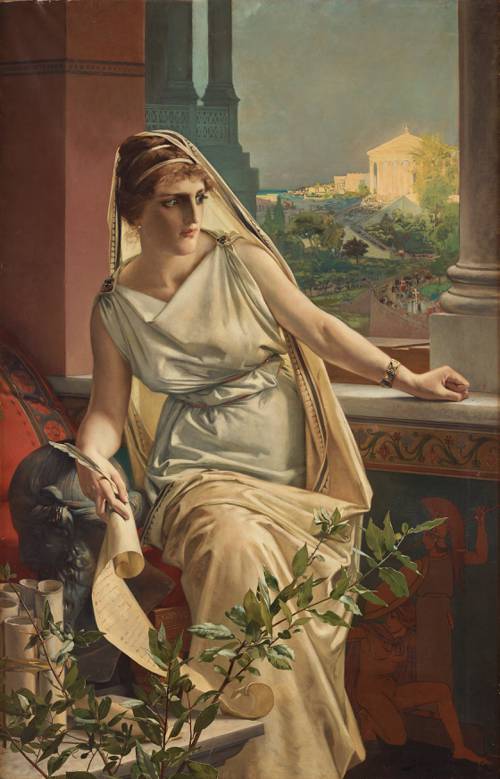
FAQ About Hypatia

Who was Hypatia of Alexandria?
Hypatia of Alexandria was a Greek philosopher, astronomer, and mathematician who lived in the Hellenistic period. She was born around 360 CE and became one of the most renowned scholars of her time. Hypatia was the head of the Neoplatonic school in Alexandria, where she taught philosophy, astronomy, and mathematics. Her work and teachings made significant contributions to these fields, and she became a symbol of learning and scientific inquiry.

What contributions did Hypatia make to mathematics and astronomy?
Hypatia made significant contributions to mathematics and astronomy, continuing the legacy of her father, Theon of Alexandria. She is believed to have written a commentary on Diophantus' 'Arithmetica' and edited Ptolemy's 'Almagest' and 'Handy Tables,' which helped preserve these important works. Her work involved simplifying and improving methods for astronomical calculations and instruments, which played a crucial role in the subsequent development of these sciences.

What is Hypatia best known for?
Hypatia is best known for her role as a scholar and teacher in the Neoplatonic school of Alexandria. She was a prominent figure in philosophy, mathematics, and astronomy during a time when such intellectual pursuits were threatened by political and religious strife. Her work symbolized the spirit of scientific inquiry and rational thought in an era increasingly dominated by religious dogmatism.

Why is Hypatia's death considered significant?
Hypatia's death is significant because it marked a tragic turning point in the history of science and philosophy. She was murdered by a Christian mob in 415 CE, a victim of rising tensions between pagans, Christians, and Jews in Alexandria. Her death is often seen as a symbol of the conflict between science and religion, as well as the decline of classical learning in the wake of the rise of religious orthodoxy.

How did Hypatia die?
Hypatia was murdered in March 415 CE by a mob of Christian zealots. According to historical accounts, she was dragged from her chariot, stripped, and brutally killed. Her body was then mutilated and burned. Her death was a result of political and religious conflicts in Alexandria at the time, and it marked a significant moment in the history of the decline of Greek philosophical traditions.

What role did religion play in Hypatia's life and death?
Religion played a significant role in Hypatia's life and, most notably, in her death. As a pagan philosopher and scientist living in a city with a growing Christian population, Hypatia was seen as a threat to the Christian authorities. Her close association with Orestes, the Roman governor of Alexandria, who was in conflict with Cyril, Bishop of Alexandria, further entangled her in political and religious disputes. This ultimately led to her murder by a Christian mob, highlighting the era's religious tensions and the danger faced by those who pursued philosophical knowledge outside the dominant religious dogmas.

Was Hypatia involved in any political activities?
Hypatia was known to be a counselor to Orestes, the Roman governor of Alexandria. Her position as an advisor involved her in the city's political life, which was fraught with tension between the secular authorities and the religious leaders. Although she was not a politician, her intellectual influence and relationships with key political figures made her a target in the political-religious conflicts of the time.

What are some common misconceptions about Hypatia?
A common misconception about Hypatia is that she was solely a mathematician. In reality, her contributions spanned philosophy and astronomy as well. Additionally, her death is sometimes romanticized or oversimplified as a singular moment of science versus religion, when in fact, it was the result of complex socio-political and religious dynamics in Alexandria. Another misconception is the belief that she invented the hydrometer, though this is debated amongst historians.

How has Hypatia's legacy influenced modern society?
Hypatia's legacy has had a profound impact on modern society as a symbol of intellectual courage and the pursuit of knowledge. Her life is often invoked in discussions about academic freedom and the conflict between science and religion. The story of her tragic death has been used to highlight the consequences of intolerance and the importance of safeguarding intellectual diversity. In popular culture, she has been depicted in various media, reinforcing her role as an icon of women's contributions to science and philosophy.

What sources describe Hypatia's life and works?
Key sources that describe Hypatia's life and works include the writings of her contemporary, Synesius of Cyrene, who was one of her students and an important primary source. Later historical accounts by writers like Socrates of Constantinople, who provided a narrative of her death, and philosophical references by Damascius are also crucial. These sources are supplemented by interpretations and analyses by modern historians and scholars who attempt to reconstruct the historical context and significance of her contributions.

How was Hypatia received by her contemporaries?
Hypatia was highly respected by her contemporaries as a thinker and teacher. She was regarded as a wise and virtuous individual who drew many students and followers from different parts of the world to Alexandria. Despite the eventual hostility that led to her tragic death, she was praised by her students and other intellectuals of the time for her extensive knowledge, teaching skills, and moral integrity.

Did Hypatia publish any written works?
Hypatia herself did not publish widely known original works, but she is attributed with writing commentaries and editing significant works of predecessors, such as those on Diophantus' 'Arithmetica' and Ptolemy's 'Almagest.' These contributions helped to clarify and preserve critical mathematical and astronomical texts of Ancient Greece. Her intellectual legacy is primarily transmitted through the work of her students and followers.

What philosophical ideas did Hypatia teach?
Hypatia taught Neoplatonism, a philosophical system rooted in the teachings of Plato. Neoplatonism emphasizes the role of the mind and the metaphysical development of the soul towards a greater unity with the divine. Her teachings integrated intellectual rigor with a philosophical understanding of the world, and she was known to incorporate mathematics and astronomy as part of the philosophical inquiry, reflecting a holistic approach to science and philosophy.

What was the political climate in Alexandria during Hypatia's life?
During Hypatia's lifetime, Alexandria was a city of immense cultural and intellectual diversity but also of significant political and religious tension. The city was part of the Eastern Roman Empire and served as a major center of education and commerce. The rise of Christianity fundamentally altered religious dynamics, leading to conflicts between pagans, Christians, and Jews. This volatile atmosphere significantly impacted Alexandria's political, social, and religious landscape, which eventually contributed to Hypatia's tragic fate.

Did Hypatia have any notable students?
Yes, Hypatia had several notable students, the most famous being Synesius of Cyrene. Synesius later became the Bishop of Ptolemais and maintained correspondence with Hypatia, praising her intellect and teachings. Her students were drawn from diverse regions, reflecting her wide influence as a teacher whose intellectual and philosophical insights significantly impacted those she taught.

In what ways has Hypatia been depicted in popular culture?
Hypatia has been depicted in various forms of popular culture, including literature, film, and theater. One of the most notable representations is in the 2009 film 'Agora,' which dramatizes her life and death. She is also the subject of novels, plays, and works of art that often highlight her contributions to science and philosophy and her tragic end as a symbol of intellectual resistance against dogmatic forces.

What is the significance of Hypatia's work on geometrical and astronomical texts?
Hypatia's work on geometrical and astronomical texts was significant in preserving and clarifying the methods used in these disciplines. Her editing and commentary on works like Ptolemy's 'Almagest' facilitated their understanding and use by later scholars. These contributions helped transmit critical knowledge from ancient traditions to future generations, reinforcing Alexandria's role as a vital center of knowledge during her time.

How do historians view the historical accounts of Hypatia's life?
Historians view the historical accounts of Hypatia's life with a critical eye, recognizing the challenges in separating facts from later interpretations and possible biases. While contemporary sources like Synesius provide valuable insights, they are limited, leading historians to rely on later works by Socrates of Constantinople and others. Modern scholarship aims to piece together these diverse accounts to understand her contributions and the socio-political factors leading to her demise.

Is there any verified information about Hypatia's early education?
There is limited verified information about Hypatia's early education, but it is widely believed that she was educated by her father, Theon of Alexandria, who was a mathematician and scholar. Theon taught her mathematics and astronomy, establishing a foundation for her intellectual pursuits. Her education was progressive for the time, likely encompassing a broad range of subjects that contributed to her later achievements as a teacher and scholar.

How was Hypatia's relationship with the Christian community in Alexandria?
Hypatia's relationship with the Christian community in Alexandria was complex. She was respected by some members for her wisdom and learning, but her status as a pagan intellectual and her association with political figures like Orestes, who were at odds with Church authorities, generated hostility. This animosity between her and leading Christian figures, particularly Cyril, Bishop of Alexandria, played a significant role in the increasing tension that resulted in her murder.
